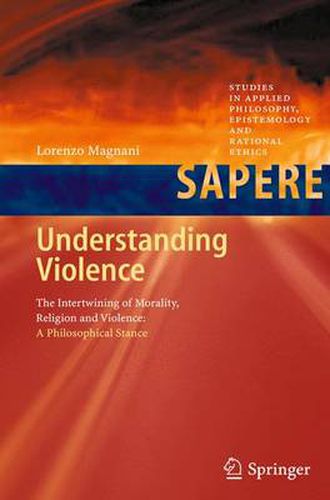Readings Newsletter
Become a Readings Member to make your shopping experience even easier.
Sign in or sign up for free!
You’re not far away from qualifying for FREE standard shipping within Australia
You’ve qualified for FREE standard shipping within Australia
The cart is loading…






This title is printed to order. This book may have been self-published. If so, we cannot guarantee the quality of the content. In the main most books will have gone through the editing process however some may not. We therefore suggest that you be aware of this before ordering this book. If in doubt check either the author or publisher’s details as we are unable to accept any returns unless they are faulty. Please contact us if you have any questions.
This volume sets out to give a philosophical applied account of violence, engaged with both empirical and theoretical debates in other disciplines such as cognitive science, sociology, psychiatry, anthropology, political theory, evolutionary biology, and theology. The book’s primary thesis is that violence is inescapably intertwined with morality and typically enacted for moral reasons. To show this, the book compellingly demonstrates how morality operates to trigger and justify violence and how people, in their violent behaviors, can engage and disengage with discrete moralities. The author’s fundamental account of language, and in particular its normative aspects, is particularly insightful as regards extending the range of what is to be understood as violence beyond the domain of physical harm. By employing concepts such as coalition enforcement , moral bubbles , cognitive niches , overmoralization , military intelligence and so on, the book aims to spell out how perpetrators and victims of violence systematically disagree about the very nature of violence. The author’s original claim is that disagreement can be understood naturalistically, described by an account of morality informed by evolutionary perspectives as well. This book might help us come to terms with the fact that we are intrinsically violent beings . To acknowledge this condition, and our stupefying capacity to inflict harm, is a responsibility we must face up to: such understanding could ultimately be of help in order to achieve a safer ownership of our destinies, by individuating and reinforcing those cognitive firewalls that would prevent violence from always escalating and overflowing.
$9.00 standard shipping within Australia
FREE standard shipping within Australia for orders over $100.00
Express & International shipping calculated at checkout
This title is printed to order. This book may have been self-published. If so, we cannot guarantee the quality of the content. In the main most books will have gone through the editing process however some may not. We therefore suggest that you be aware of this before ordering this book. If in doubt check either the author or publisher’s details as we are unable to accept any returns unless they are faulty. Please contact us if you have any questions.
This volume sets out to give a philosophical applied account of violence, engaged with both empirical and theoretical debates in other disciplines such as cognitive science, sociology, psychiatry, anthropology, political theory, evolutionary biology, and theology. The book’s primary thesis is that violence is inescapably intertwined with morality and typically enacted for moral reasons. To show this, the book compellingly demonstrates how morality operates to trigger and justify violence and how people, in their violent behaviors, can engage and disengage with discrete moralities. The author’s fundamental account of language, and in particular its normative aspects, is particularly insightful as regards extending the range of what is to be understood as violence beyond the domain of physical harm. By employing concepts such as coalition enforcement , moral bubbles , cognitive niches , overmoralization , military intelligence and so on, the book aims to spell out how perpetrators and victims of violence systematically disagree about the very nature of violence. The author’s original claim is that disagreement can be understood naturalistically, described by an account of morality informed by evolutionary perspectives as well. This book might help us come to terms with the fact that we are intrinsically violent beings . To acknowledge this condition, and our stupefying capacity to inflict harm, is a responsibility we must face up to: such understanding could ultimately be of help in order to achieve a safer ownership of our destinies, by individuating and reinforcing those cognitive firewalls that would prevent violence from always escalating and overflowing.